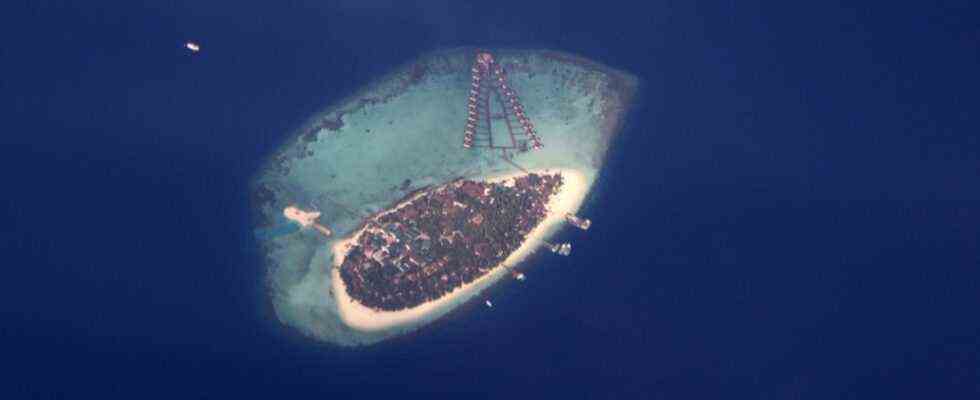Donating money leaves many people with divided feelings. Doing good tends to make you happy. But there is also this uneasiness of not knowing exactly what is actually going to happen with the money. It starts with the alms for the homeless at the main train station. You might like to buy him a warm meal with it, but fear an investment in high-proof. The more money you want to donate, the more worries you will certainly not be less worried.
The financial sector in Germany is still at the beginning of a link between donations and its product portfolio. Philanthropy funds for wealthy customers can be found primarily in Switzerland or Liechtenstein. In this country, the offer is very manageable. Deutsche Bank entered the segment just a few weeks ago. With its “Ocean Resilience Philanthropy Fund” for the protection of the seas and coasts, it offers those interested the chance to become a charity.
In a first step, the fund wants to collect EUR 300,000 for a research project in the Maldives. The aim is to save the genetic data of special coral species that may have grown due to climate change. Sounds good and offers the potential for Deutsche Bank to present itself as a financial institution that cares about sustainability. But the timing is not good.
Because the fund subsidiary of the bank, the asset management company DWS, is currently confronted with greenwashing allegations. DWS firmly rejects the allegations made by a former employee. Identify the regulators. DWS is now an independent company. But as is the case in many families, allegations against the daughters always stick a bit with the mother. As soon as the investigation became known, the bank’s share price plummeted.
There are still no standards to categorize the risks
Henry Schäfer thinks that the “Ocean Resilience Philanthropy Fund” came out only a good two months later to be “rather clumsy”. The former holder of the Chair of Finance at the University of Stuttgart, who develops and accompanies sustainable investment strategies with his consulting company Ecco-works, sees no connection between the events. The corporate divisions are too independent of one another for that. But he sees the danger that a suspicion of greenwashing could “be carried over to the new product”.
Nevertheless, Deutsche Bank decided to launch. “A test balloon,” as Schäfer says. The manageable sum that is to be collected at the beginning could be increased to five million euros in the long term in order to support further marine protection projects. The basic prerequisite for success, however, is that there are enough donors who are willing to forego profit. It starts from one euro.
Philanthropy or charity funds are not investments in the usual sense of the word. What is special about it is that money is either donated directly to existing, so-called theme funds or a separate fund is set up in the name of the donor – all without interest income.
If a project fails, the money is ineffective
In the case of the theme funds, categories are usually created for use, for example health or education, for which the money is continuously collected from various donors and spent on corresponding projects. In the case of name funds, similar to a foundation, the funds brought in are used in projects. The advantage: the donor can determine exactly in which form the donation will be used.
Although there is no return, there are also certain risks with philanthropy funds. Because if a project fails, the money is ineffective. “A comprehensive understanding of the complexity of the problems of the needy is usually beyond the imagination of the wealthy. This results in a risk of simplification,” warns Georg von Schnurbein, Professor of Foundation Management at the University of Basel. Often well-intentioned projects could therefore get into trouble.
Because the market for philanthropy funds is still very young, there are still no standards that could categorize risks to sustainability. The problem is also known to the GLS Bank, which competes with its products in the area of impact investing with competitors who are not paying close attention. In contrast to donations, impact investing promises an increase in your own wealth.
As a commercial partner, GLS offers, among other things, funds that are also supported by the Kreditanstalt für Wiederaufbau (KfW) as a form of development aid. This involves microfinance in the Middle East and Africa. A 20 million GLS investment in the Regional MSME Investment Fund for Sub-Saharan Africa (REGMIFA) will only be announced shortly, according to company circles.
“GLS is in demand as a kind of anchor investor in such projects, because on the one hand we have high demands on our investment goals and on the other hand we have a lot of experience in the field,” says company spokesman Julian Mertens. Because whoever has the GLS on board gives their offer even more credibility.
The Bochum-based bank has its own investment committee, half of which is made up of external experts from environmental or human rights organizations. After a thorough examination, the committee decides whether a system is an impact-oriented investment.

